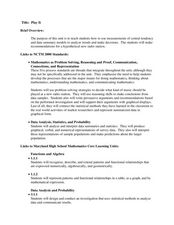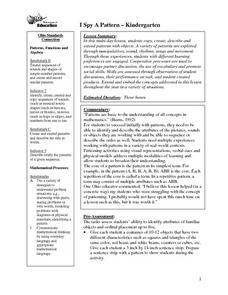Curated OER
Flying with Pythagoras
A lengthy narrative about Pythagoras and his young scholars precedes an activity in which your young mathematicians practice using the Pythagorean theorem to solve three problems about flight and distance. Answers are provided.
For the Teachers
$1 Math
Captivate your class by having them find the value of their names, different zoo animals, musical instruments, etc.,with a mental math lesson. Using the coding formula listed, children learn to fluently estimate and calculate simple sums.
Utah Education Network (UEN)
Simplifying Algebraic Expressions
Sixth and seventh graders explore the concept of simplifying algebraic expressions. They review the order of operations and apply properties to simplify and compare them. The author suggests using a "Boxes Game" as a motivator to get...
Curated OER
Volume of Rectangular Prisms: Algebra/Geometry Institute Summer 2009
Learners find the volume of rectangular prisms. In this volume lesson plan, students use a formula to find the volume of rectangular prisms. They discuss the definition of volume and draw rectangular prisms. Learners identify the...
Curated OER
Play It
There are a number of activities here that look at representing data in different ways. One activity, has young data analysts conduct a class survey regarding a new radio station, summarize a data set, and use central tendencies to...
Curated OER
And Around We Go!
Sixth graders conduct a survey and collect data to construct a bar graph that will then be changed into a circle graph. With the bar graph, 6th graders compare estimated fractions and percentages and estimate percentages. With the circle...
Curated OER
I Spy a Pattern-Kindergarten
Students copy, create, describe, and extend patterns with objects. They explore a variety of patterns through the use of manipulatives, sound, rhythms, songs and movement. Cooperative processes are used to encourage partner discussion.








